"If more of us valued food and cheer and song over hoarded gold, it would be a merrier world." - J.R.R. Tolkien
Pages
▼
Wednesday, April 29, 2020
Squid Mixes: Eeyore's Requiem
Yes, it's named after the donkey in Winnie-the-Pooh. The drink was created by Toby Maloney who describes Eeyore as "the most bitter character in literature." My recipe - from David Lebovitz - combines Campari, dry vermouth, gin, Cynar, Frenet-Branca, orange bitters and orange twist. That's a lot of bitter ingredients for one drink!
I would be interested to drink this one side-by-side with a Negroni (see here). I'm not sure they're all that different in terms of flavor - the Eeyore essentially being a Negroni with more stuff in it (though switching out the sweet vermouth for dry). My guess is the Eeyore might have some extra citrus hints but the Campari dominates both intensely bitter drinks. At least to my mind, a drink involving three ingredients wins out over a similar one involving six, especially when two of the extras - the Cynar and the Frenet-Branca - are definitely on the more exotic side and thus less dynamic for use in other cocktails.
Squid on the Vine
Another wine class this week. Last week, it was whites. This week, reds...
Arnot-Roberts, El Dorado Gamay Noir 2018
Medium color, hits of yellow
Aroma: delicate side of medium; raspberries, jammy, vanilla, bubblegum
Drier than it smells
Medium+ acidity
Medium tannin
My rating: 8.2
Château Haut-Segottes, Saint-Émilion Grand Cru Red Brdeaux Blend 2016
Deeper in color
Medium aroma: more earthy, wet leaves
Dry
Medium acidity
Medium+ tannin
My rating: 8.0
Benevelli Piero, Langhe Nebbiolo 2018
Delicate aroma: raspberry, strawberry, raisins, olive
Dry
High tannin
High acidityMy rating: 8.0
Another red, not part of the class...
Lezaun, Navarra Red Blend 2018
High tannin
My Rating: 8.0
Monday, April 27, 2020
Marvel Immersion Project: Silver Surfer #1-4 and Fantastic Four #59-60
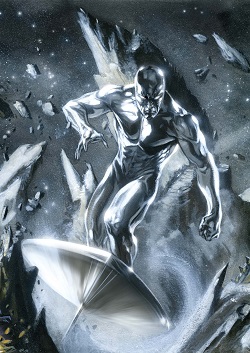 |
| via Wikipedia |
Even though I've just begun the series, I can already tell I'm going to have a lot to say about Silver Surfer. As observer and self-appointed Earth protector, the character is well-positioned to express much of the social commentary that was prevalent in the late 1960s. Stan Lee and his team were clearly not fans of United States foreign policy at the time, injecting the story with the typical anti-Vietnam rhetoric: battling for nameless causes, imposing values on other cultures, resorting to violence as the answer to all problems, etc. The Surfer is frustrated by humankind's more barbaric tendencies and tries to help, though usually is perceived as the source of the very threats he's trying to combat.
As I wrote a couple weeks ago (read here), I see similarities between the messaging of the Silver Surfer story and that of Star Trek: a greater openness in confronting the other, a need for moral maturity across society, etc. While the links may be coincidental, I did wonder about the connections between the two. Interestingly, DC published a crossover comic with both at one point - I found a cover but no publication date. Doug Jones, who played both the Silver Surfer in Fantastic Four: Rise of the Silver Surfer and Saru in Star Trek: Discovery sees important parallels between the two characters. Read here.
For me, the Surfer is a more appealing hero than the Fantastic Four or even Spider-Man. He wants to help but also to learn. His powers exceed that of 99% of Marvel superheroes yet he doesn't have the Reed Richards arrogance of always best understanding how to use them for the greater good. Godlike though he is, his back story is quite humanizing.
I'm looking forward to a fun ride.
My Recent Reads
Fantastic Four #59
Originally Published February 1, 1967
Writer: Stan Lee
Artist: Jack Kirby
- The Inhumans finally break free, not just of the negative zone but of the entire barrier between them and the human world. It took Black Bolt's voice to do the job. He is usually silent, you see. Never mind that he destroyed the entire city in the process.
- After the Silver Surfer, Black Bolt may be my favorite new character from this stretch.
- The original band of six we met at the outset has been sent off by the Council of Elders to enter the world of the humans - an unexplained narrative contrivance, though I suppose you've gotta move the story forward somehow.
- Meanwhile, Dr. Doom continues to flaunt his Silver Surfer powers, wreaking havoc and terror around the globe. This story is a cautionary tale about what could happen when the wrong person is granted far too much power. If only we ever heeded such warnings...
Fantastic Four #60
March 1, 1967
Lee/Kirby
- The finale of the Dr. Doom Steals Silver Surfer's Powers story.
- Doom is defeated on the last page, foiled by measures set in place by Galactus to keep the Silver Surfer from ever leaving Earth. It's not an especially satisfying ending - a little too quick, frankly. Also, in my heart, I wanted Silver Surfer himself to be the one to save the day. Alas, it's not his series.
- The Inhumans make their first contact with humans. It doesn't go well.
- It's time to move on from Fantastic Four. As I've written before, I doubt I'll return to this particular quartet of heroes. However, I'll definitely be back for the Inhumans! Meanwhile, we move on to Silver Surfer.
August 1, 1968
Writer: Stan Lee
Artist: Gene Colan
- The Silver Surfer Origin Story
- Name: Norrin Radd
- Home World: Zenn-La (a mash-up of Zen and Shangri-la?)
- True Love: Shalla Bal, for whom he is doomed to pine
 |
| via Marvel Database |
- How he became Silver Surfer: When Galactus attacked the peaceful and prosperous Zenn-La, the already restless Norrin Radd offered himself up to be the invader's herald in exchange for sparing the planet.
Silver Surfer #2
October 1, 1968 (note: bi-monthly series; makes sense with double-length issues)
Lee/Colan
- Nemesis: The Brotherhood of Badoon
 | |
| via Wikipedia |
- Noticing greater diversity in races and hairstyles among Earth's citizenry.
Silver Surfer #3
December 1, 1968
Writer: Lee
Artist: John Buscema
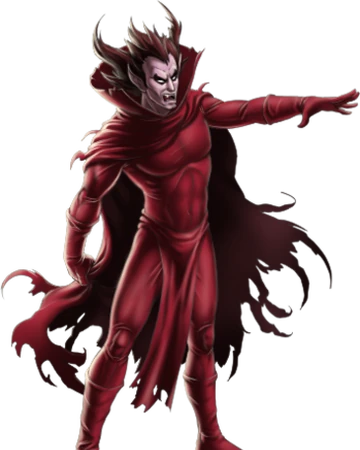 |
| via Villains Wiki |
- Nemesis: Mephisto, based on Mephistopheles
- Not for the last time, a baddie uses the Surfer's love for Shalla Bal to manipulate him.
- Important question raised: How would you use the power of a god to save the world from itself?
Silver Surfer #4
February 1, 1969
Lee/Buscema
- Thor crossover. The Surfer travels to Asgard.
- Nemesis: Loki, who has the power to override Galactus's barrier against the Surfer leaving Earth
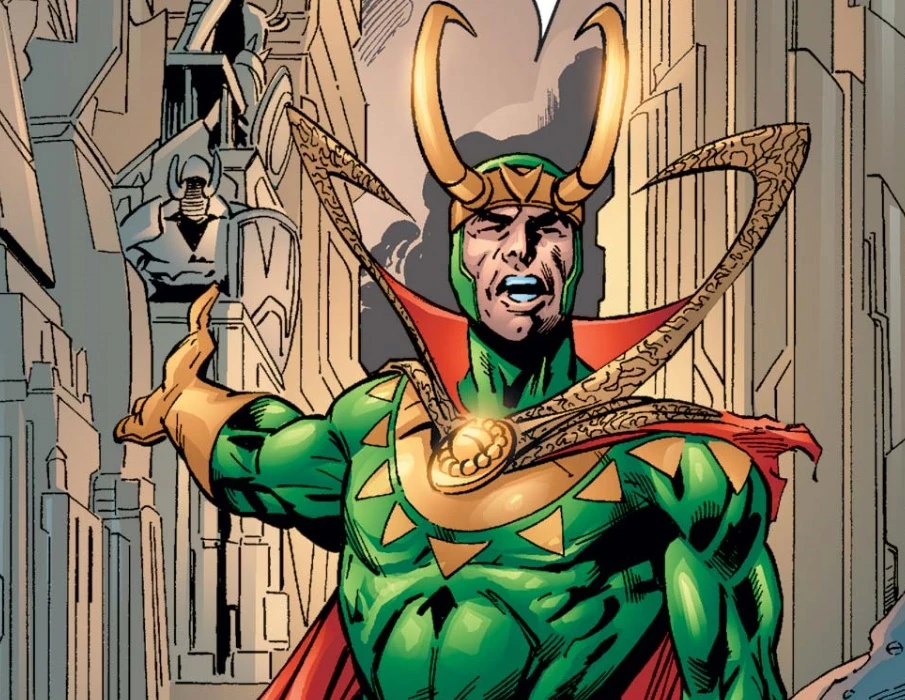 |
| via Heroes Wiki |
- Loki tricks the Surfer into thinking Thor is an evil tyrant and enlists his help to defeat him.
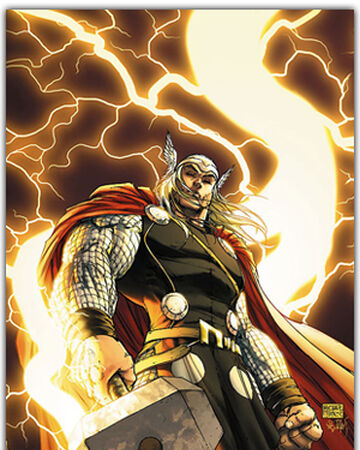 |
| via Deadliest Fiction Wiki |
- We get to see an extensive cast of Asgardians: Volstagg, Fandral, Hogun, Sif, Heimdall, Balder and Odin.
- This story had a lot of promise. I'd love to see the series return to it but I don't know if it does. I'm certainly up for more Asgard adventures anyway.
Friday, April 24, 2020
Star Trek: The Schizoid Man
Episode: "The Schizoid Man"
Series: Star Trek: The Next Generation
Season 2, Episode 6
Original Air Date: January 23, 1989
Our friends meet Dr. Ira Graves (W. Morgan Sheppard), a famous cyberneticist, as he approaches death. Graves and Data quickly bond, the scientist claiming to be the android's de facto grandfather as Graves taught Noonien Soong, Data's creator, everything he knew. As his final living act, Graves manages to transfer his own consciousness to Data. Unfortunately, Graves's massive ego is not a good pairing with Data's superhuman physical capacities. Disaster ensues (a little Of Mice and Men-ish, actually). Executive producer Gene Roddenberry's health was very much in decline by 1989 and one wonders if the prevalence of aging and death stories was not entirely unrelated, not to mention concerns about the survival of one's legacy.
This episode is an eye-roller for me. Both Lore and Graves-possessed Data inspire over-acting tendencies in Brent Spiner. Nonetheless, there is decent Data development. His rights as a sentient being are challenged and Geordi is identified for the first time as his best friend.
The Graves role was initially intended for Patrick McGoohan, star of the 1967 British classic series The Prisoner. "The Schizoid Man" was also the title of a Prisoner episode.
I can never resist a Wizard of Oz reference. Both pre- and post-possession, Graves whistles "If I Only Had a Heart," presumably to tease Data:
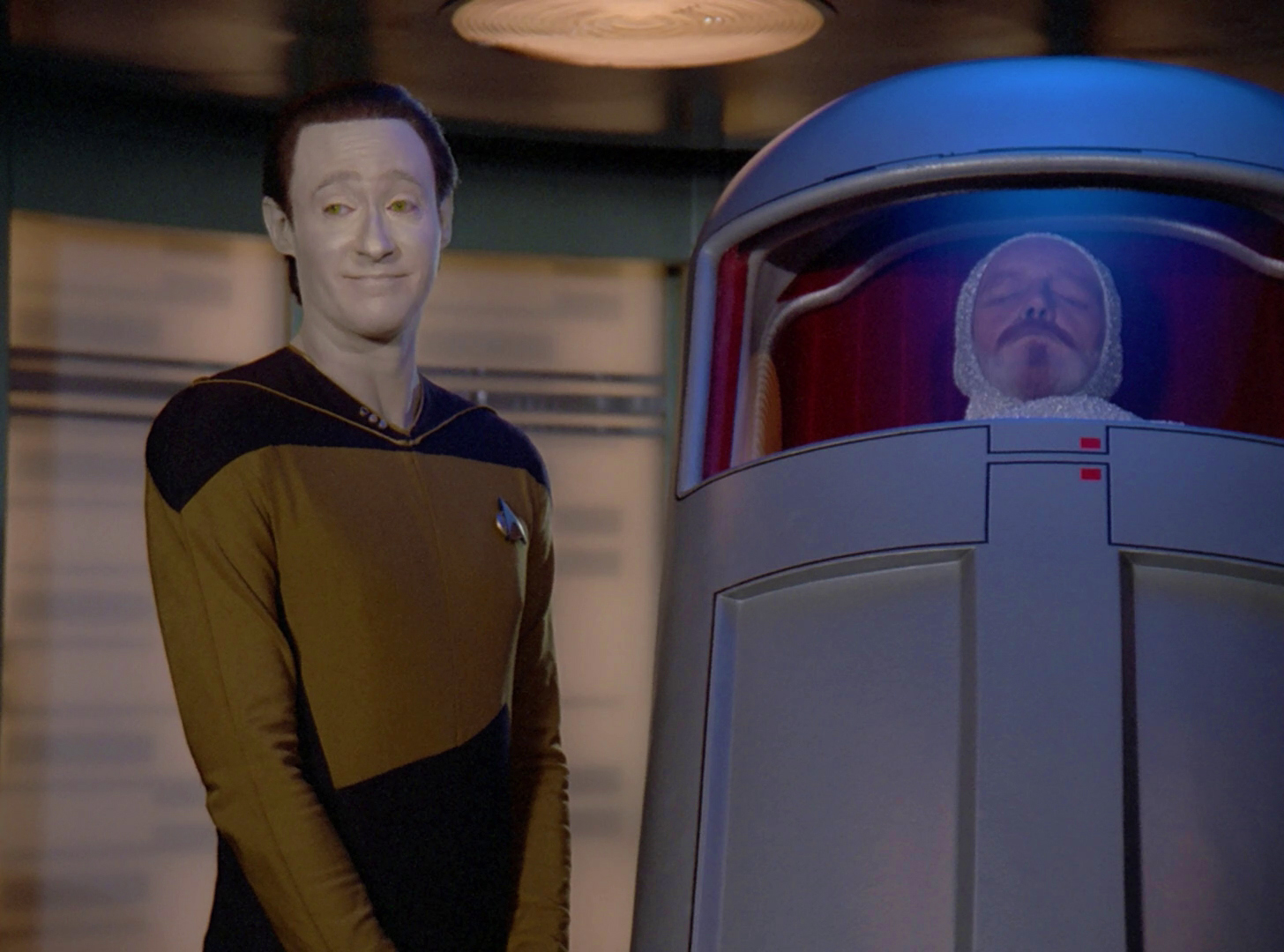 |
| via Memory Alpha |
This episode is an eye-roller for me. Both Lore and Graves-possessed Data inspire over-acting tendencies in Brent Spiner. Nonetheless, there is decent Data development. His rights as a sentient being are challenged and Geordi is identified for the first time as his best friend.
The Graves role was initially intended for Patrick McGoohan, star of the 1967 British classic series The Prisoner. "The Schizoid Man" was also the title of a Prisoner episode.
Music Notes
I can never resist a Wizard of Oz reference. Both pre- and post-possession, Graves whistles "If I Only Had a Heart," presumably to tease Data:
Acting Notes
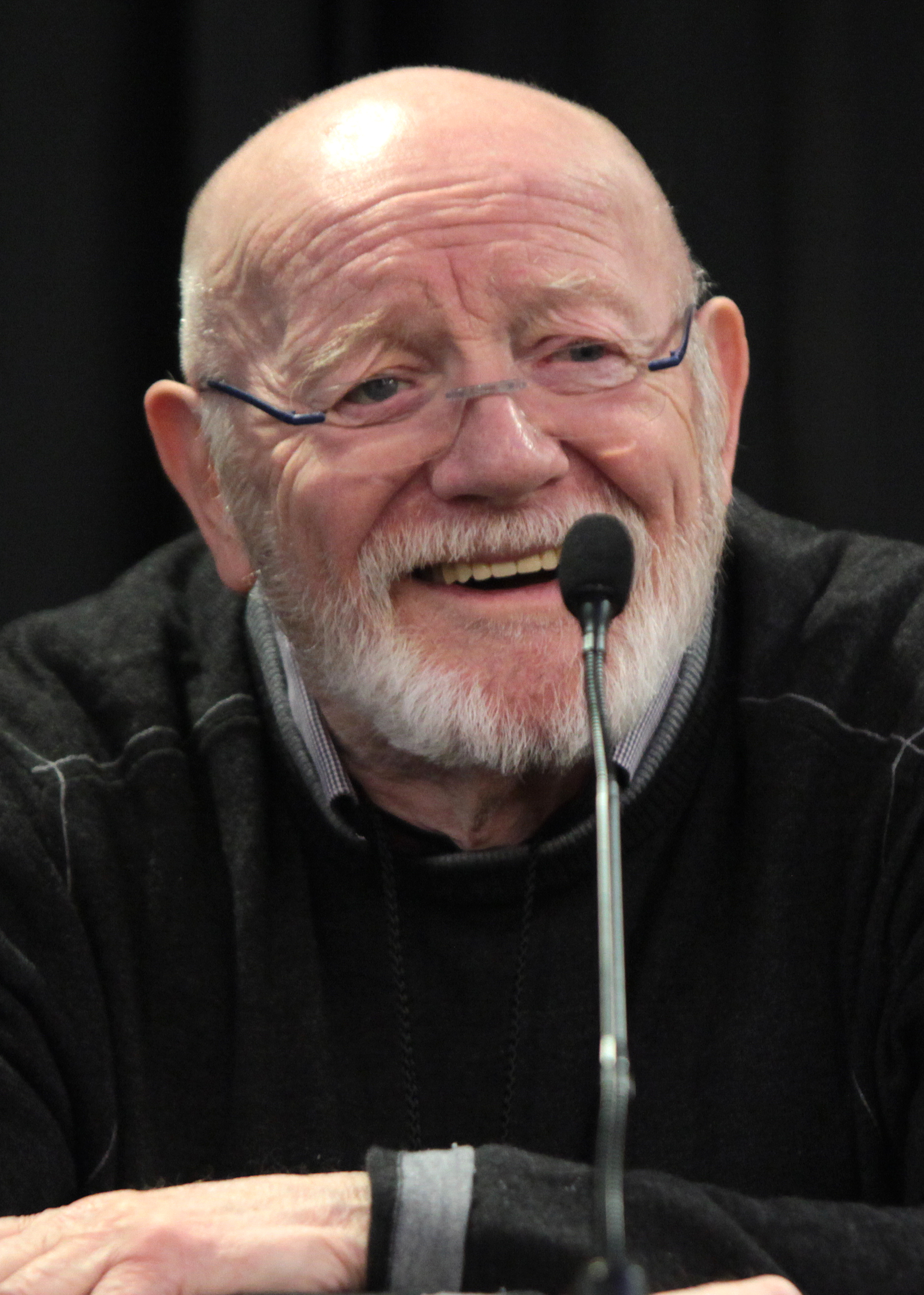 |
| via Wikipedia |
William Morgan Sheppard was born August 24, 1932 in London. Like Patrick Stewart, he was an alumnus of the Royal Shakespeare Company, logging 12 years of service. On Broadway, he appeared in Marat/Sade and Sherlock Holmes. He had four Trek appearances in total, including two of the movies.
 |
| via Wikipedia |
Sheppard's son, Mark Sheppard, is a megastar of geeky television: a principal on Supernatural plus recurring roles on Doctor Who, Battlestar Galactica, Leverage and Firefly. Father and son appeared together in "The Impossible Astronaut", the first episode of Doctor Who's Series Six.
W. Morgan Sheppard died January 6, 2019 in Los Angeles, California. He was 86 hears old.
Wednesday, April 22, 2020
Squid Mixes: Stinger
I got my stinger recipe from my good friend and fellow blogger, Nancy Mock. Here's the article she wrote on the drink for Taste of Home. It's a great piece, including a history of the drink and several pop culture references.
The cocktail combines brandy and white creme de menthe. The result is quite minty, indeed. Had me pondering thin mint cocktail possibilities. There are such recipes online, of course, though I'd want to experiment on my own, probably using creme de cacao for the chocolate. I don't know if we'll be having stingers again but it's always fun to play around with new flavor ideas.
Squid on the Vine
Our favorite wine shop is doing online classes. This week's featured wines...
Chevalier Muscadet Clos de la Butte 2018
Pale in color
Medium aroma - tart peach
Dry
My rating: 82
Failla Sonoma Coast Chardonnay 2017
Darker, more gold in color
Delicate aroma - ripe pear
Dry
My rating: 81
Stein Weihwasser Riesling Feinherb 2018
Light in color, though more gold than the Muscadet
Pineapple nose
Sweeter
My rating: 83
All three wines were more acidic than I would generally go for. Our instructor really likes high acid wines. Not so sure I do. It was less of a problem, though, with the Riesling. As she pointed out herself, the sweetness and the acid set each other off nicely.
Squid on the Vine
Our favorite wine shop is doing online classes. This week's featured wines...
Chevalier Muscadet Clos de la Butte 2018
Pale in color
Medium aroma - tart peach
Dry
My rating: 82
Failla Sonoma Coast Chardonnay 2017
Darker, more gold in color
Delicate aroma - ripe pear
Dry
My rating: 81
Stein Weihwasser Riesling Feinherb 2018
Light in color, though more gold than the Muscadet
Pineapple nose
Sweeter
My rating: 83
All three wines were more acidic than I would generally go for. Our instructor really likes high acid wines. Not so sure I do. It was less of a problem, though, with the Riesling. As she pointed out herself, the sweetness and the acid set each other off nicely.
Monday, April 20, 2020
Marvel Immersion Project: Fantastic Four #54-58 and Annual #4
I'm going to be moving on from Fantastic Four soon and before I do, it's imperative I pay tribute to one of the giants of the comic book industry.
Jack Kirby was born Jacob Kurtzburg in New York City, August 28, 1917. He started working in comics in the 1930s and, over the course of his career, spent meaningful creative time with both Marvel and DC. He will always be best remembered for his work during Marvel's Silver Age, claiming co-creator status for Captain America, Fantastic Four, Thor, Avengers, Hulk, Iron Man, Black Panther, X-Men and Silver Surfer among many, many others. Make no mistake he, more than Stan Lee, was the creative force behind the pop cultural powerhouse that would eventually spawn the Marvel Cinematic Universe. He generated the look, fleshed out the characters and developed the worlds they roam. As discussed previously (read here), he played a much larger storytelling role than cover credits would have one believe. If only he'd lived long enough to make cameos in the movies...
Kirby was also drafted into the Army during World War II, landing on Omaha Beach two months after D-Day. When his commanding officer learned of Kirby's artistic talents, he assigned him as an advance scout to draw reconnaissance maps and pictures. During his tour, he suffered frostbite and nearly had his legs amputated. For his service, he received the Combat Infantry Badge, a European/African/Middle Eastern Campaign Medal and a Bronze Star.
Jack Kirby died of heart failure in 1994.
A few thoughts about the FF, too, before the week's issue notes: while character development was the initial hook for this series, I feel that long term, world-building was the greater strength. In this #31-60 stretch I've explored, the FF visited the Skrull world, the Inhumans' sanctuary and Wakanda, all for the first time. All three have provided rich narrative possibilities for Marvel in the decades since. In #48, the Silver Surfer was introduced and he has proven a more interesting character than any of the Fantastic Four themselves. His first solo series is where I'll be heading next.
My Recent Reads
Fantastic Four #54
Originally Published September 1, 1966
Writer: Stan Lee
Author: Jack Kirby
Fantastic Four #55
October 1, 1966
Lee/Kirby
Fantastic Four #56
November 1, 1966
Lee/Kirby
Fantastic Four Annual #4
November 1, 1966
Lee/Kirby
Fantastic Four #57
December 1, 1966
Lee/Kirby
Fantastic Four #58
January 1, 1967
Lee/Kirby
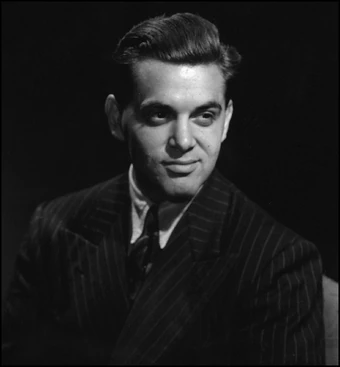 |
| via Spider-Man Wiki |
Jack Kirby was born Jacob Kurtzburg in New York City, August 28, 1917. He started working in comics in the 1930s and, over the course of his career, spent meaningful creative time with both Marvel and DC. He will always be best remembered for his work during Marvel's Silver Age, claiming co-creator status for Captain America, Fantastic Four, Thor, Avengers, Hulk, Iron Man, Black Panther, X-Men and Silver Surfer among many, many others. Make no mistake he, more than Stan Lee, was the creative force behind the pop cultural powerhouse that would eventually spawn the Marvel Cinematic Universe. He generated the look, fleshed out the characters and developed the worlds they roam. As discussed previously (read here), he played a much larger storytelling role than cover credits would have one believe. If only he'd lived long enough to make cameos in the movies...
Kirby was also drafted into the Army during World War II, landing on Omaha Beach two months after D-Day. When his commanding officer learned of Kirby's artistic talents, he assigned him as an advance scout to draw reconnaissance maps and pictures. During his tour, he suffered frostbite and nearly had his legs amputated. For his service, he received the Combat Infantry Badge, a European/African/Middle Eastern Campaign Medal and a Bronze Star.
Jack Kirby died of heart failure in 1994.
A few thoughts about the FF, too, before the week's issue notes: while character development was the initial hook for this series, I feel that long term, world-building was the greater strength. In this #31-60 stretch I've explored, the FF visited the Skrull world, the Inhumans' sanctuary and Wakanda, all for the first time. All three have provided rich narrative possibilities for Marvel in the decades since. In #48, the Silver Surfer was introduced and he has proven a more interesting character than any of the Fantastic Four themselves. His first solo series is where I'll be heading next.
My Recent Reads
Fantastic Four #54
Originally Published September 1, 1966
Writer: Stan Lee
Author: Jack Kirby
- There is no true villain in this issue. That's noteworthy in itself.
- The story opens with a baseball game in Wakanda. The FF, particularly Reed Richards, can't resist using their powers - poor sportsmanship.
- The Black Panther enlists a world-famous pianist to play Grieg's Piano Concerto for his guests. It's one of my favorite pieces. Read here.
- Another interesting change from what I've seen with the series up to this point: the beginning of two split, multi-issue threads: one for Johnny Storm and Wyatt Wingfoot as Johnny seeks a way to get back to Crystal of the Inhumans and another for the others returning to New York.
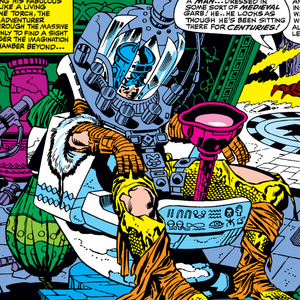 |
| via Marvel Database |
- Johnny and Wyatt meet Prester John, also known as The Wanderer.
Fantastic Four #55
October 1, 1966
Lee/Kirby
- The Silver Surfer returns. Thing picks a fight with him, jealous over Alicia's apparent interest in him. Thing fails to understand that her feelings for the Silver Surfer are not romantic in nature.
- Finally reaching the Himalayas (I could have sworn the Inhumans were in the Andes but I guess not), Johnny and Wyatt encounter Lockjaw, the Inhumans' faithful, dimension-jumping hound.
Fantastic Four #56
November 1, 1966
Lee/Kirby
- Villain: Klaw, attacking the three FF members in New York in an effort to draw out the Black Panther.
- Johnny and Wyatt follow Lockjaw through several dimensional jumps. Wyatt is trying to train the dog to lead them to the Inhumans, something he's clearly been trained previously not to do.
Fantastic Four Annual #4
November 1, 1966
Lee/Kirby
- The Fantastic Four are reunited.
- Villain: The Thinker
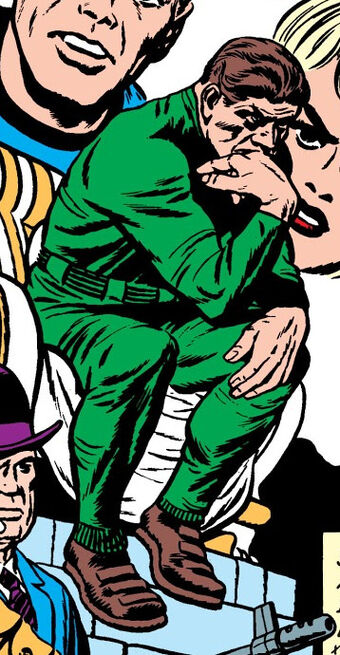 |
| via Marvel Database |
- The Thinker has enlisted the help of the original Human Torch, an android character who first appeared in October 1939.
 |
| via Wikipedia |
Fantastic Four #57
December 1, 1966
Lee/Kirby
- Main villains: Sandman and Wizard
- Meanwhile, a separate thread begins in which the Silver Surfer visits Dr. Doom. The latter steals the powers of the former.
- Mary Poppins reference!
Fantastic Four #58
January 1, 1967
Lee/Kirby
- Villain: Dr. Doom, enhanced by the powers he stole from the Silver Surfer
- The issue ends with a cliffhanger, the FF having suffered apparent defeat.
Friday, April 17, 2020
Star Trek: Loud as a Whisper
Episode: "Loud as a Whisper"
Series: Star Trek: The Next Generation
Season 2, Episode 5
Original Air Date: January 9, 1989
 |
| via Wikipedia |
The Enterprise provides transport to Riva (Howie Seago), a deaf ambassador, to peace talks on a planet which has been feuding for centuries. Riva has a Greek chorus which accompanies him and translates his thoughts. It's an Id-Ego-Superego arrangement as the three members represent different realms of communication. It's very Freud, of course, but also very Trek. Id-Ego-Superego = Bones-Kirk-Spock.
Seago, a deaf actor, approached the producers with the story idea which had initially come from his wife, a huge Trekkie. The narrative crisis comes when Riva's chorus is killed. The writers initially intended for Riva to learn to speak when that occurred but Seago nixed the idea. Instead, in a last-minute rewrite, Data quickly learns sign language in order to translate for Riva.
I must say, it's a little surprising that the ship's universal translator couldn't sort out sign language. Maybe in the next upgrade.
The morality play is a little heavy-handed but the story is different and therefore interesting. Plus, there's good development for both Picard and Troi. Picard is at his composed and forceful best when Riva falls apart over the loss of his chorus. Troi gets a brief romance with Riva - it would seem few among the Enterprise's visitors can resist hitting on her.
Howie Seago was born December 5, 1953 in Tacoma, Washington. He was born deaf, his father's side of the family having a history of hearing impairment. Most of his acting work has been on stage, beginning with the National Theatre of the Deaf, which he joined in college. He was the first deaf actor to perform with the Oregon Shakespeare Festival, featuring in such productions as Hamlet, Into the Woods and The Music Man. In the latter, he played Marcellus Washburn, my own part in high school.
Seago, a deaf actor, approached the producers with the story idea which had initially come from his wife, a huge Trekkie. The narrative crisis comes when Riva's chorus is killed. The writers initially intended for Riva to learn to speak when that occurred but Seago nixed the idea. Instead, in a last-minute rewrite, Data quickly learns sign language in order to translate for Riva.
I must say, it's a little surprising that the ship's universal translator couldn't sort out sign language. Maybe in the next upgrade.
The morality play is a little heavy-handed but the story is different and therefore interesting. Plus, there's good development for both Picard and Troi. Picard is at his composed and forceful best when Riva falls apart over the loss of his chorus. Troi gets a brief romance with Riva - it would seem few among the Enterprise's visitors can resist hitting on her.
Acting Notes
 |
| via Wikipedia |
Howie Seago was born December 5, 1953 in Tacoma, Washington. He was born deaf, his father's side of the family having a history of hearing impairment. Most of his acting work has been on stage, beginning with the National Theatre of the Deaf, which he joined in college. He was the first deaf actor to perform with the Oregon Shakespeare Festival, featuring in such productions as Hamlet, Into the Woods and The Music Man. In the latter, he played Marcellus Washburn, my own part in high school.
Wednesday, April 15, 2020
Squid Mixes: Bulleit vs. Jim Beam Pre-Prohibition
Social distancing has not stopped our whiskey battles! Fortunately, our favorite liquor is still doing curbside service. Bulleit rye was on sale last month and Jim Beam Pre-Prohibition is on sale this month. It's time for a rumble.
The tale of the tape going in: at full-price, JB is $5 cheaper than the Bulleit. Both are 90 proof.
On the Rocks Test
The Jim Beam was redder in color, fruitier in flavor with a chocolate aftertaste.
I found the Bulleit more flavorful. Spicy banana was the best description I could think of.
My wife preferred the Jim Beam. I preferred the Bulleit. Call this round a tie.
Manhattan Test
The Bulleit was smokier, the JB fruitier once again. Our individual preferences were the same as before though my wife could imagine enjoying the Bulleit occasionally. Both were quite nice.
Call this round a tie, too.
We skipped the Highball Test this time, figuring it wasn't going to be the make-or-break anyway.
Overall Winner: Jim Beam Pre-Prohibition
All else being equal, $5 is $5. We drink most of our whiskey via Manhattans so my wife's preference is probably a tie-breaker as well. That said, I wouldn't mind having a bottle of the Bulleit around for the occasional sipping, something I'm more likely to do than she is anyway. It's certainly worth waiting until it's on sale.
Hoping to pit Jim Beam against George Dickel next. That one goes on sale in May!
Squid on the Vine
Borell Diehl, Müller-Thurgau 2018
A German white
Bland to star, like a light cider
Opens up bigger.
A little bitter
Bubblegum finish
My Rating: 8.2
The tale of the tape going in: at full-price, JB is $5 cheaper than the Bulleit. Both are 90 proof.
On the Rocks Test
The Jim Beam was redder in color, fruitier in flavor with a chocolate aftertaste.
I found the Bulleit more flavorful. Spicy banana was the best description I could think of.
My wife preferred the Jim Beam. I preferred the Bulleit. Call this round a tie.
Manhattan Test
The Bulleit was smokier, the JB fruitier once again. Our individual preferences were the same as before though my wife could imagine enjoying the Bulleit occasionally. Both were quite nice.
Call this round a tie, too.
We skipped the Highball Test this time, figuring it wasn't going to be the make-or-break anyway.
Overall Winner: Jim Beam Pre-Prohibition
All else being equal, $5 is $5. We drink most of our whiskey via Manhattans so my wife's preference is probably a tie-breaker as well. That said, I wouldn't mind having a bottle of the Bulleit around for the occasional sipping, something I'm more likely to do than she is anyway. It's certainly worth waiting until it's on sale.
Hoping to pit Jim Beam against George Dickel next. That one goes on sale in May!
Squid on the Vine
Borell Diehl, Müller-Thurgau 2018
A German white
Bland to star, like a light cider
Opens up bigger.
A little bitter
Bubblegum finish
My Rating: 8.2
Monday, April 13, 2020
Marvel Immersion Project: Fantastic Four #49-53 and Annual #3
So much to say about this stretch. Best to dig right in...
My Recent Reads
Fantastic Four Annual #3
Originally Published October 1, 1965
Writer: Stan Lee
Artist: Jack Kirby
Fantastic Four #49
Originally Published April 1, 1966
Lee/Kirby
Fantastic Four #50
Originally Published May 1, 1966
Lee/Kirby
Fantastic Four #51
Originally Published June 1, 1966
Lee/Kirby
Fantastic Four #52
Originally Published July 1, 1966
Lee/Kirby
Fantastic Four #53
Originally Published August 1, 1966
Lee/Kirby
My Recent Reads
Fantastic Four Annual #3
Originally Published October 1, 1965
Writer: Stan Lee
Artist: Jack Kirby
- The wedding of Reed and Sue Richards!
- Primary villain: Dr. Doom, using a mind control machine to unleash an onslaught of Marvel baddies upon the happy ceremony.
- Fortunately, the FF invited their own vast posse of Marvel superheroes to save the day.
- Highlight: a cameo for Stan and Jack themselves at the end.
Fantastic Four #49
Originally Published April 1, 1966
Lee/Kirby
- Part two of the Galactus Trilogy
- The Fantastic Four face the enormous task of stopping Galactus from stripping Earth of all its life energy. In this act of heartlessly destroying an entire civilization for his own gain, Galactus reminds me of Star Trek's Borg.
- The Watcher sends the Human Torch through hyperspace to his own planet in order to retrieve a weapon.
- Through complete coincidence, the Silver Surfer stumbles into the apartment of Alicia Masters, Ben/Thing's girlfriend. Contrived though the encounter is, their conversation is the turning point of the entire narrative. Through Alicia, the Surfer learns of humanity's capacity for compassion. It's quite moving. I got goosebumps. No joke!
Fantastic Four #50
Originally Published May 1, 1966
Lee/Kirby
- The Galactus Trilogy concludes spectacularly.
- The Silver Surfer turns on Galactus, his master, having gained sympathy for humanity through his encounter with Alicia in the previous issue.
- Torch returns with the weapon from the Watcher's world.
- Galactus finally relents when faced with the Watcher's weapon in Reed's hands. He doesn't go quietly, stripping the Silver Surfer of his space-time powers as punishment for his rebellion.
 |
| via PopOptiq |
- Galactus's final frame, a 3/4 box at the top of page 10, is extraordinary. His parting words: "And at last I perceive the glint of glory within the race of man! Be ever worthy of that glory, humans... Be ever mindful of your promise of greatness!... For it shall one day lift you beyond the stars... or bury you within the ruins of war!! The choice is yours!!"
- Wow!
- Worth noting: this story was published in the spring of 1966. A rather famous science fiction franchise would debut on television screens in September of that year (see here). I don't know if the Galactus Trilogy had a direct impact on Star Trek but Galactus's message would certainly have resonated with Trek creator Gene Roddenberry. The entire premise of the series is predicated on Earth having attained a more enlightened morality, thus being worthy of engaging with alien cultures. Humanity on trial is certainly a narrative well Trek has gone back to frequently. Perhaps, as the United States was becoming more deeply embroiled in the Vietnam War, a lot of people were coming to similar conclusions.
- For his part, the Silver Surfer suggests a connection to another franchise: Doctor Who. In fact, aren't both Galactus and the Surfer essentially Time Lords? I guess not any more for the Surfer once he's stripped of his broader traveling powers but his coming to the defense of humankind is quite Doctor-like indeed.
- Amazingly, with all of that, there was still room for another story: Johnny Storm goes to college, the fictional Metro College. We meet his new roommate, Wyatt Wingfoot.
 |
| via Marvel Database |
Fantastic Four #51
Originally Published June 1, 1966
Lee/Kirby
- An unnamed villain kidnaps Ben Grimm and takes on his powers.
- The world of Johnny Storm's college life gets some development. We meet Coach Thorne who does his best to recruit Wyatt Wingfoot for the football team. We learn Wyatt is the son of a famous decathlete. Clearly Wyatt is an homage to Jim Thorpe, Olympic champion decathlete and pentathlete as well as a star in the early years of the National Football League. Like Wyatt, Thorpe was a Native American.
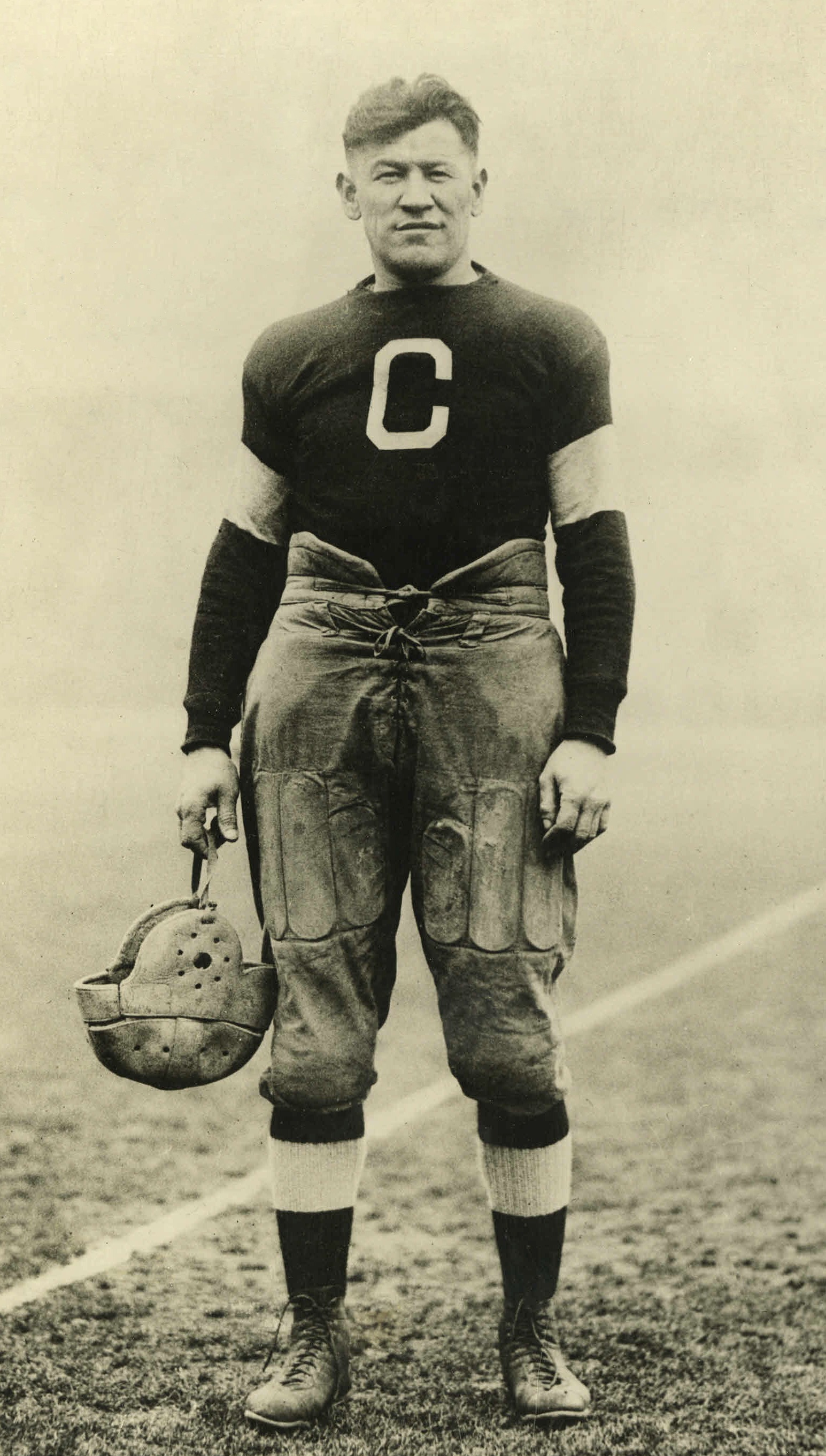 |
| via Wikipedia |
Fantastic Four #52
Originally Published July 1, 1966
Lee/Kirby
- I read and discussed this issue fairly recently (see here). At that time, I considered the story from the Black Panther perspective. Now, I can view it more clearly from the FF side.
- The Black Panther has invited the Fantastic Four to Wakanda for a "Most Dangerous Game"-esque adventure. He intends to hunt them.
- Wyatt is brought along for the ride. When I read this comic before in February, I wondered if the Black Panther story is, at its heart, racist. I'll get to back to that question in a bit. For now, I can say the Wyatt part most certainly is. He demonstrates the stereotypical scouting and tracking prowess of what are at one point described as his "red-skinned forebears." He definitely wears the noble savage mantle.
- Lawrence Welk reference!
Fantastic Four #53
Originally Published August 1, 1966
Lee/Kirby
- The Black Panther story continues. After the FF managed to outwit the BP, he flips around to become a welcoming host. He tells his new friends the history of Wakanda and the Vibranium which is the source of the nation's technological sophistication and his own personal wealth.
- And yes, the story is definitely racist. The costuming and tribal dance employed are straight out of the same mindset that brought the "1940s tribal Africa" concept to Star Trek's notorious "Code of Honor" episode. The Black Panther is a highly educated man and his citizens are, in truth, far from primitive. But the fact remains, they still look as 1960s white America would expect them to look and there's no reason they need to.
- Is this the price of inclusion, for both Blacks and Native Americans? I can't say I saw any non-Caucasian Earthlings on Fantastic Four's pages prior to #53. Black Panther is not a criminal or a servant. In 1966, does this qualify as progress?
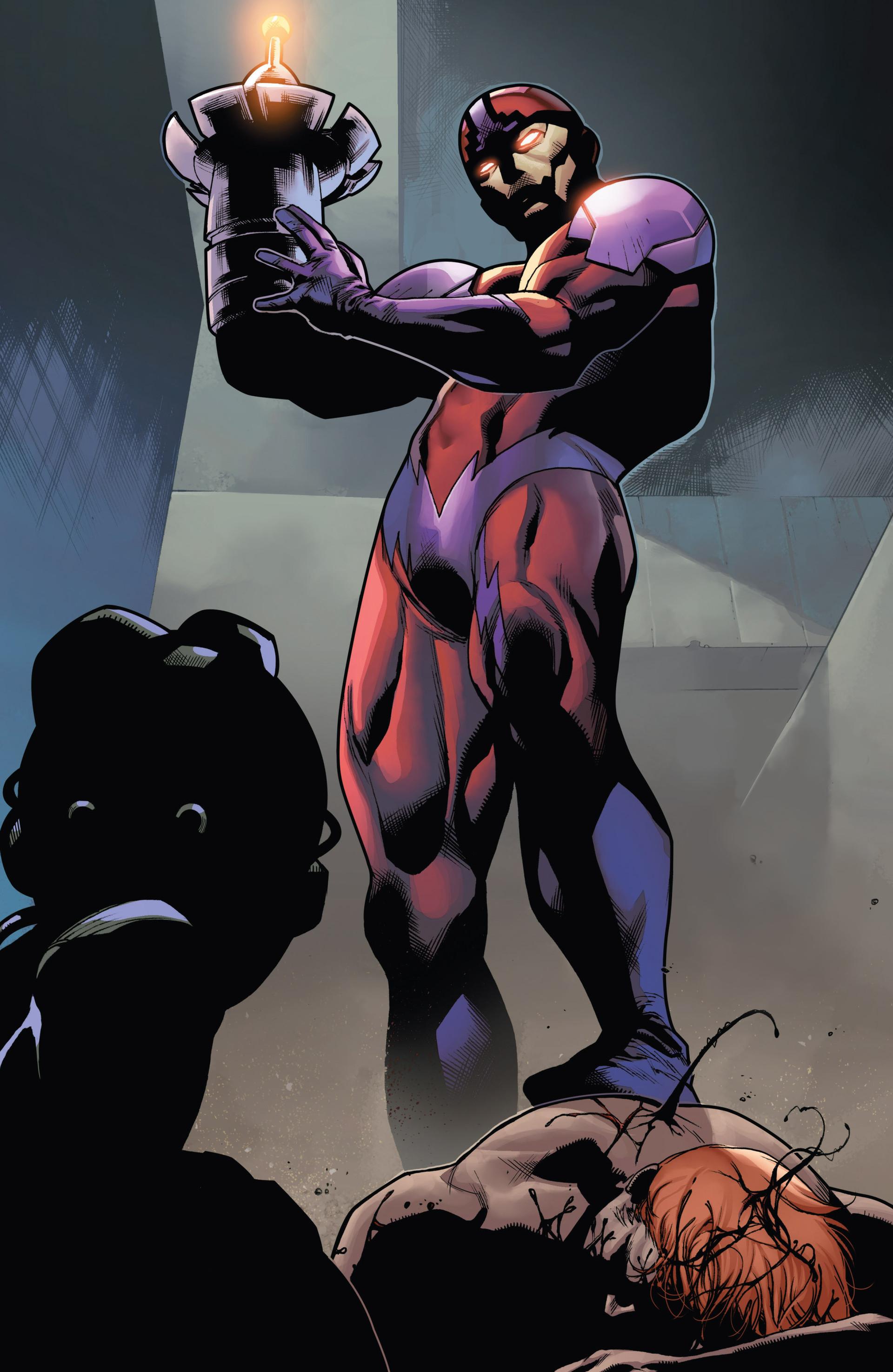 |
| via Marvel Database |
- We get the first FF/BP team up. Together, they take on Klaw, the man who killed BP's father, T'Chaka, the prior Black Panther and King of Wakanda.
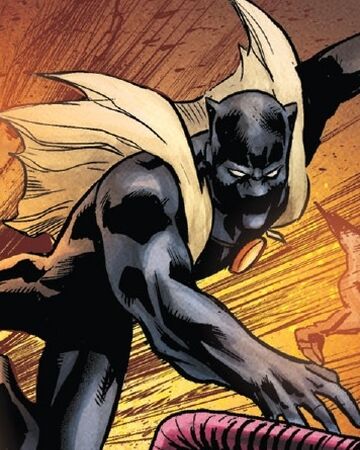 |
| via Marvel Database |
Friday, April 10, 2020
Star Trek: The Outrageous Okuna
Episode: "The Outrageous Okuna"
The Enterprise picks up Okuna (William O. Campbell), a freighter captain with a twinkle in his eye - imagine a Han Solo-type who is more forward, and more successful, with women. Charming as he is, he manages to put our friends in the middle of an interplanetary feud - shades of Romeo & Juliet, happier ending thankfully. Meanwhile, Data is learning about humor from a holodeck comedian played by Joe Piscopo.
This one's fun - nothing spectacular but fun. Okuna is likeable and even admirable by story's end. Campbell was actually one of the original candidates to play Riker but he was thought to be too "soft," therefore better suited to this role. Teri Hatcher, she of a later, more famous Seinfeld episode, also appears, though un-credited, by her own request after much of her material was cut. Good development for Data, too. His one inadvertant joke is genuinely funny:
Guinan: You spoiled the joke. It could have been your timing.
Data: My timing is digital.
Joe Piscopo was born June 17, 1951 in Passaic, New Jersey. In 1980, he signed on with Saturday Night Live. He was part of the ill-fated cast that followed on the heels of the legendary originals. The replacements were received so poorly that most were let go after one season. Only Piscopo and Eddie Murphy survived. Piscopo built his reputation on impressions, most famously of Frank Sinatra:
I remember his Miller Lite commercials fondly:
Jerry Lewis was the original choice for the holodeck comedian but his schedule didn't work out. In tribute, Piscopo did his routine, mostly ad-libbed, in Lewis's style.
Piscopo is referenced in Tom Petty and the Heartbreakers' "Jammin' Me":
These days, Piscopo has a daily radio show, Piscopo in the Morning on WNYM.
Series: Star Trek: The Next Generation
Season 2, Episode 4
Original Air Date: December 12, 1988
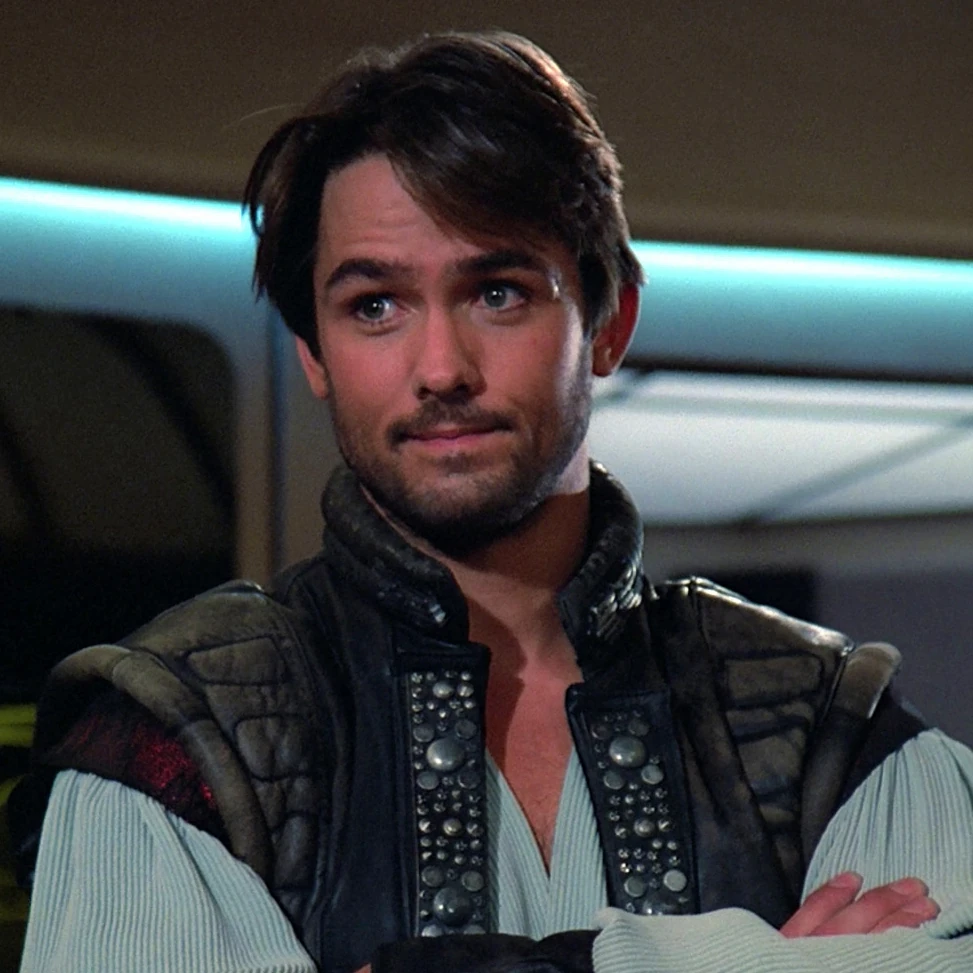 |
| via Memory Alpha |
The Enterprise picks up Okuna (William O. Campbell), a freighter captain with a twinkle in his eye - imagine a Han Solo-type who is more forward, and more successful, with women. Charming as he is, he manages to put our friends in the middle of an interplanetary feud - shades of Romeo & Juliet, happier ending thankfully. Meanwhile, Data is learning about humor from a holodeck comedian played by Joe Piscopo.
This one's fun - nothing spectacular but fun. Okuna is likeable and even admirable by story's end. Campbell was actually one of the original candidates to play Riker but he was thought to be too "soft," therefore better suited to this role. Teri Hatcher, she of a later, more famous Seinfeld episode, also appears, though un-credited, by her own request after much of her material was cut. Good development for Data, too. His one inadvertant joke is genuinely funny:
Guinan: You spoiled the joke. It could have been your timing.
Data: My timing is digital.
Acting Notes
| via Wikipedia |
Joe Piscopo was born June 17, 1951 in Passaic, New Jersey. In 1980, he signed on with Saturday Night Live. He was part of the ill-fated cast that followed on the heels of the legendary originals. The replacements were received so poorly that most were let go after one season. Only Piscopo and Eddie Murphy survived. Piscopo built his reputation on impressions, most famously of Frank Sinatra:
I remember his Miller Lite commercials fondly:
Jerry Lewis was the original choice for the holodeck comedian but his schedule didn't work out. In tribute, Piscopo did his routine, mostly ad-libbed, in Lewis's style.
Piscopo is referenced in Tom Petty and the Heartbreakers' "Jammin' Me":
These days, Piscopo has a daily radio show, Piscopo in the Morning on WNYM.
Wednesday, April 8, 2020
Squid Mixes: French Manhattan
This weekend, we acquired the ingredients for David Lebovitz's French Manhattan recipe, first mentioned last week. The drink involves cognac, sweet vermouth and orange liqueur in 6:6:1 ratio plus a dash of Angostura bitters and a cherry. The result is a lot fruitier than the Brandy Manhattan we tried last week and probably superior. The boost of citrus brings dimension to the sweetness. "Goes down easy," my wife said. If I were to tinker, I'd try dry vermouth instead. I haven't seen a Dry French Manhattan recipe but why not?
Monday, April 6, 2020
Marvel Immersion Project: Fantastic Four #44-48
Boy, am I glad I didn't jump ship after #43! It was tempting (see last week). This week's stretch is outstanding, beginning with the introduction of the Inhumans and ending with the introduction of the Silver Surfer. It's almost as if someone at Marvel were starting to get impatient with the series, too.
Just as I was wishing for characters with nuance, along come the Inhumans. Medusa, we learn, is a member of a super-powered race who has lived in secret in the Andes for thousands of years. The more we see, the more we get the sense of a deep, rich history, now at a moment of fascinating political intrigue (FF seems to like that stuff as the Skrull saga is also dripping with it). Are they the enemies of humanity? Potential allies? Hoping to be left alone? It's complicated, and that's why it's good.
Then we arrive at #48. When people put together must-read comic book compilations, Fantastic Four #48 is virtually guaranteed a spot on the list. It is perhaps the magnum opus of Jack Kirby, in particular. At least in the mid-'60s, the artists were responsible for a lot more of the comic book storytelling than the cover credits would suggest. As the legend goes, Stan Lee left a simple note on Kriby's desk for #48: "The Fantastic Four meet God." Jack filled in the rest for what is considered by many to be the pinnacle of Marvel's Silver Age.
I'm still not sure I especially like the Fantastic Four as characters themselves. Reed Richards, in particular, can be hard to take: arrogant, patronizing, chauvinistic. I expressed my dissatisfaction with Sue last week. Torch and Thing both whine too much. So far, Thing is the most interesting to me but even he tests my patience. So, I'm not sure if I'll ever come back to the Fantastic Four after I get to #60 but I'm definitely up for more with the Inhumans!
Meanwhile, it seems I've inadvertently skipped an episode. Double-checking the Comic Book Herald list, I realized I forgot about the annuals, most pertinently #3! So, I'll need to double back. I had been thinking it strange that I'd missed the Reed-Sue wedding. In my experience, comic book readers tend to be rather sentimental. You don't believe me? You must not have been around for all the fuss when Spider-Man got married. As such, I couldn't imagine Stan and Jack would skip right over a wedding. Wouldn't you know it, the nuptials are in Annual #3...
My Recent Reads
Fantastic Four #44
Originally Published November 1, 1965
Writer: Stan Lee
Artist: Jack Kirby
Fantatstic Four #45
Originally Published December 1, 1965
Lee/Kirby
Fantastic Four #46
Originally Published January 1, 1966
Lee/Kirby
Fantastic Four #47
Originally Published February 1, 1966
Lee/Kirby
Fantastic Four #48
Originally Published March 10, 1966
Lee/Kirby
 |
| The Inhumans: l to r, Gorgon, Crystal, Black Bolt, Medusa, Karna and Triton, via SlashFilm |
Then we arrive at #48. When people put together must-read comic book compilations, Fantastic Four #48 is virtually guaranteed a spot on the list. It is perhaps the magnum opus of Jack Kirby, in particular. At least in the mid-'60s, the artists were responsible for a lot more of the comic book storytelling than the cover credits would suggest. As the legend goes, Stan Lee left a simple note on Kriby's desk for #48: "The Fantastic Four meet God." Jack filled in the rest for what is considered by many to be the pinnacle of Marvel's Silver Age.
I'm still not sure I especially like the Fantastic Four as characters themselves. Reed Richards, in particular, can be hard to take: arrogant, patronizing, chauvinistic. I expressed my dissatisfaction with Sue last week. Torch and Thing both whine too much. So far, Thing is the most interesting to me but even he tests my patience. So, I'm not sure if I'll ever come back to the Fantastic Four after I get to #60 but I'm definitely up for more with the Inhumans!
Meanwhile, it seems I've inadvertently skipped an episode. Double-checking the Comic Book Herald list, I realized I forgot about the annuals, most pertinently #3! So, I'll need to double back. I had been thinking it strange that I'd missed the Reed-Sue wedding. In my experience, comic book readers tend to be rather sentimental. You don't believe me? You must not have been around for all the fuss when Spider-Man got married. As such, I couldn't imagine Stan and Jack would skip right over a wedding. Wouldn't you know it, the nuptials are in Annual #3...
My Recent Reads
Fantastic Four #44
Originally Published November 1, 1965
Writer: Stan Lee
Artist: Jack Kirby
- The Inhumans arc begins, though they are not named as such yet.
- Nemesis: Gorgon
- Medusa returns and we instantly realize her history is more complicated than previously suspected. Gorgon is after her.
- The Inhumans story even gets a satisfying secondary narrative. Dragon Man is back in a King Kong-like tale with first Medusa, then Sue in the Fay Wray role.
Fantatstic Four #45
Originally Published December 1, 1965
Lee/Kirby
- We meet the Inhumans, Medusa and Gorgon inclusive. Also in the gang are Crystal, Lockjaw, Karnak, Triton and the mysterious and powerful Black Bolt, revealed in the final frame.
| Lockjaw via Wikipedia |
- For Crystal and Johnny Storm, it's love at first sight.
- Frank Sinatra reference! This Grammy winner was also released in December 1965:
Fantastic Four #46
Originally Published January 1, 1966
Lee/Kirby
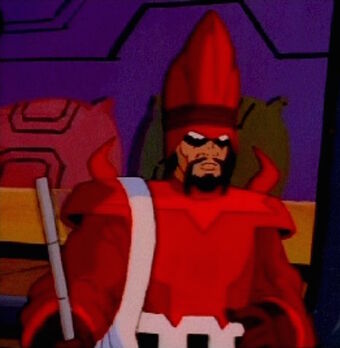 |
| via Marvel Animated Universe Wiki |
- Villain: the Seeker. who is after all of the Inhumans, intending to return them to their sanctuary.
- Inhumans origin story
Fantastic Four #47
Originally Published February 1, 1966
Lee/Kirby
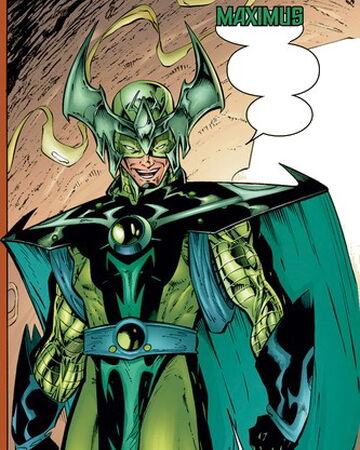 |
| via Marvel Database |
- Villain: Maximus, Black Bolt's brother and usurper as both king and Medusa's betrothed. I told you this was good!
- Black Bolt reclaims his crown.
- Maximus, in desperation, sets off the atmo-gun, threatening extinction to all human life.
Fantastic Four #48
Originally Published March 10, 1966
Lee/Kirby
- First things first: #48 finishes the Inhumans arc.
- Medusa proclaims her undying love for Black Bolt.
- When the atmo-gun fails to destroy humanity, Maximus initiates a Negative Zone, designed to drive out the Fantastic Four and keep them out, along with the rest of Earth's humans, forever.
- Crystal and Johnny are heartbroken by their separation.
- The Galactus Trilogy begins.
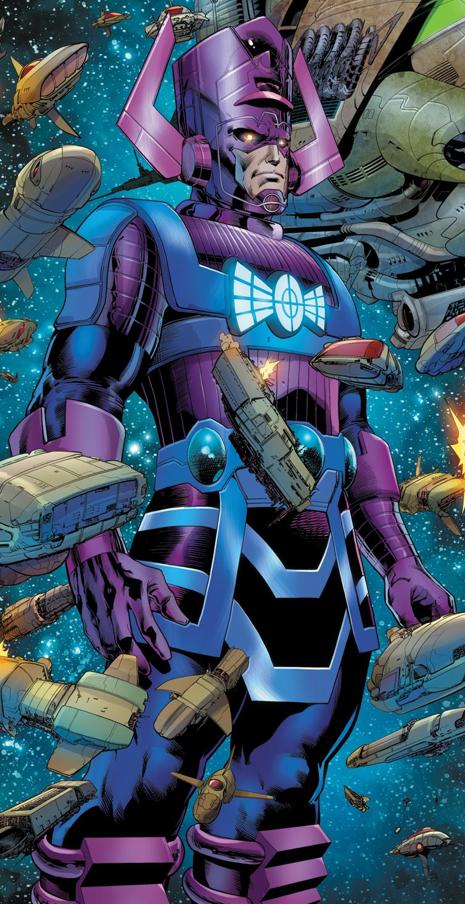 |
| Galactus via Marvel Database |
- Villains: the Silver Surfer and Galactus
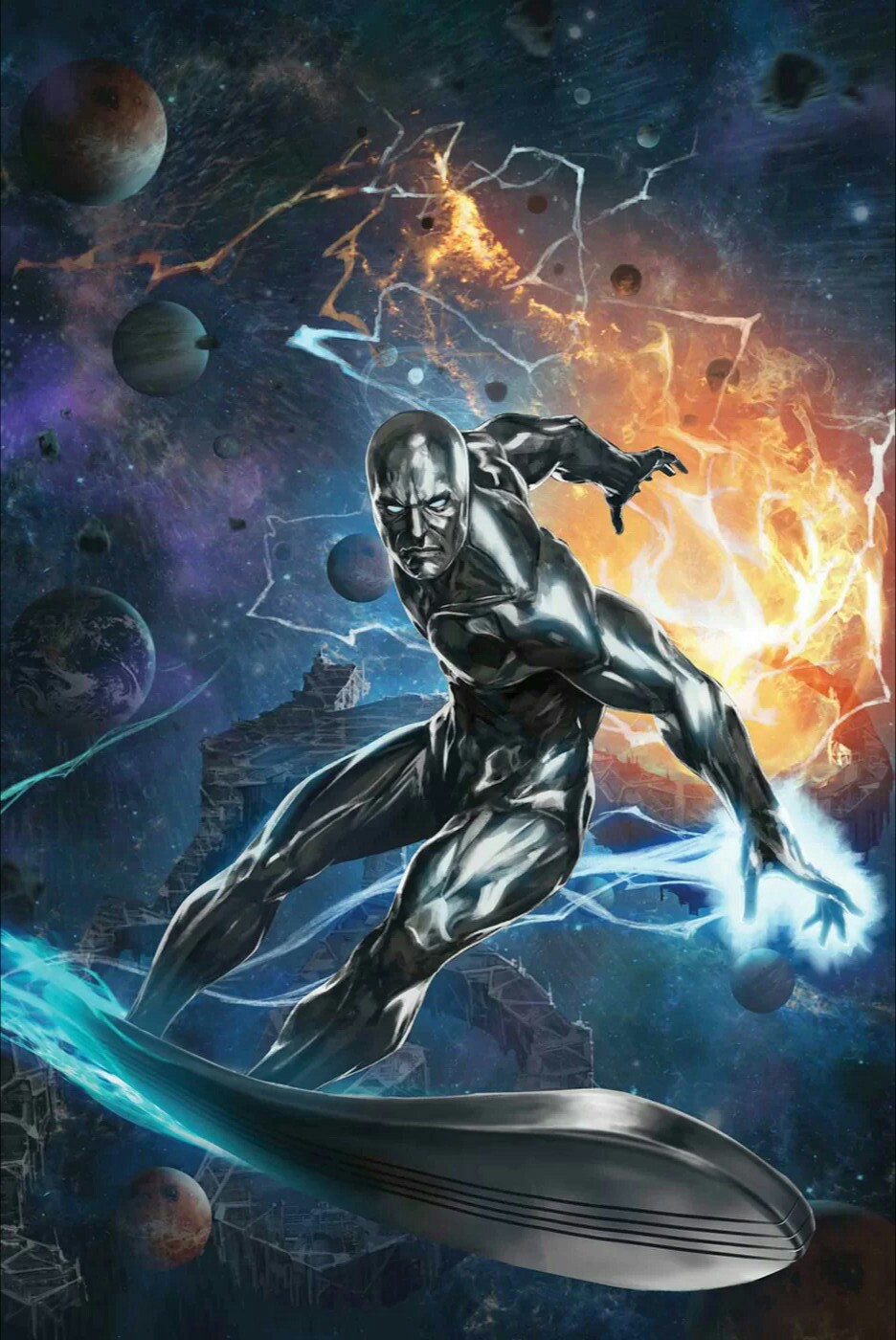 |
| Silver Surfer via Marvel Database |
- The imagery of the Silver Surfer is a nod to the prominence of surfing in the broader American popular culture of the 1960s. Hawaii was a brand new state and the romantic allure of tropical beaches was potent. California sun offered its charms as well, the Beach Boys not quite having revealed their more artistic side yet (Pet Sounds wouldn't hit record stores until May). No icon symbolized young freedom and adventure better than a man on a surfboard.
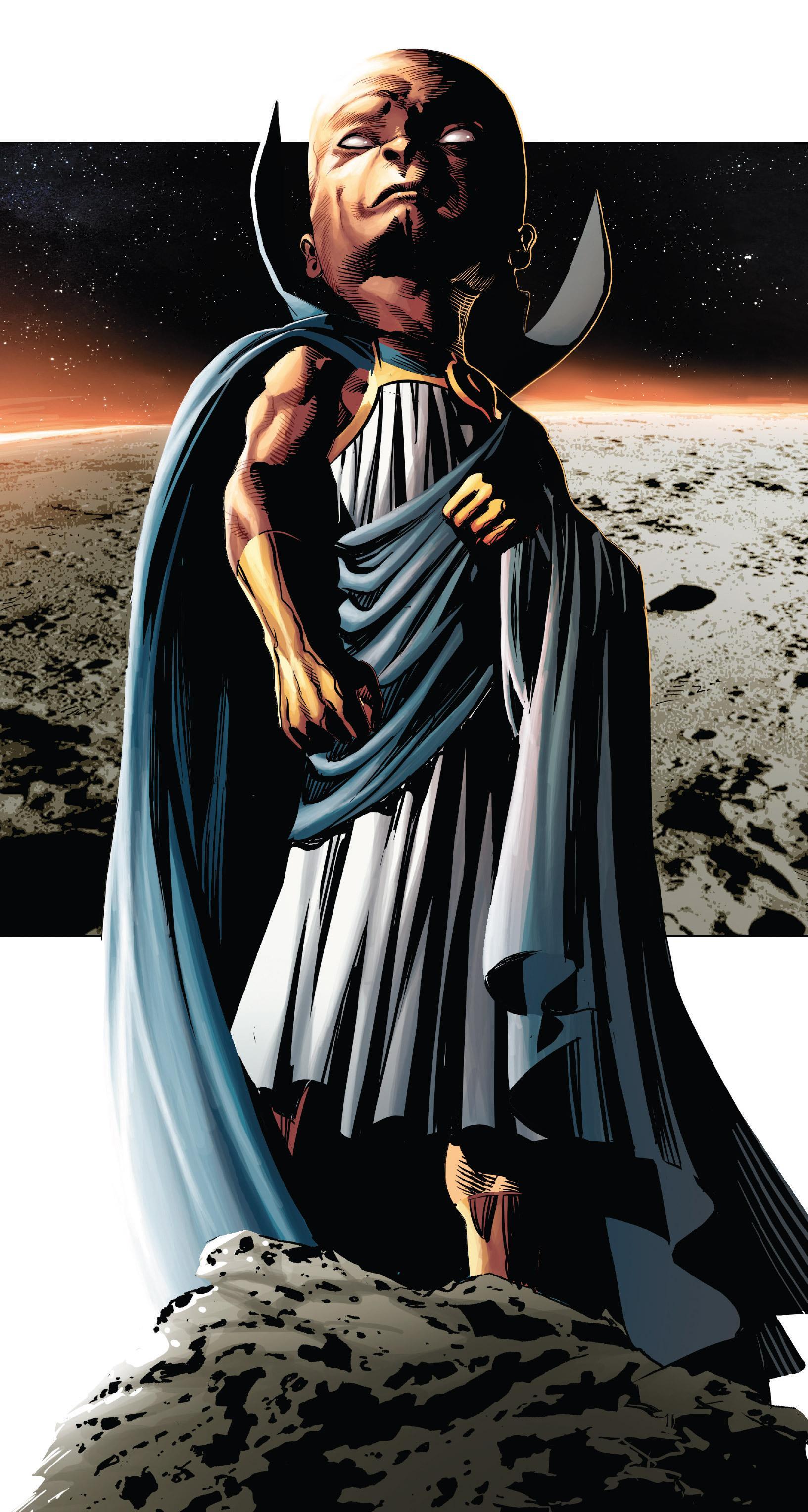 |
| The Watcher via Marvel Database |
- The Watcher returns to help defend Earth from Galactus.
- I chuckled out loud when Ben Grimm snarked about Reed's long-winded tendencies.
Friday, April 3, 2020
Star Trek: Elementary, Dear Data
Episode: "Elementary, Dear Data"
Series: Star Trek: The Next Generation
Season 2, Episode 3
Original Air Date: December 5, 1988
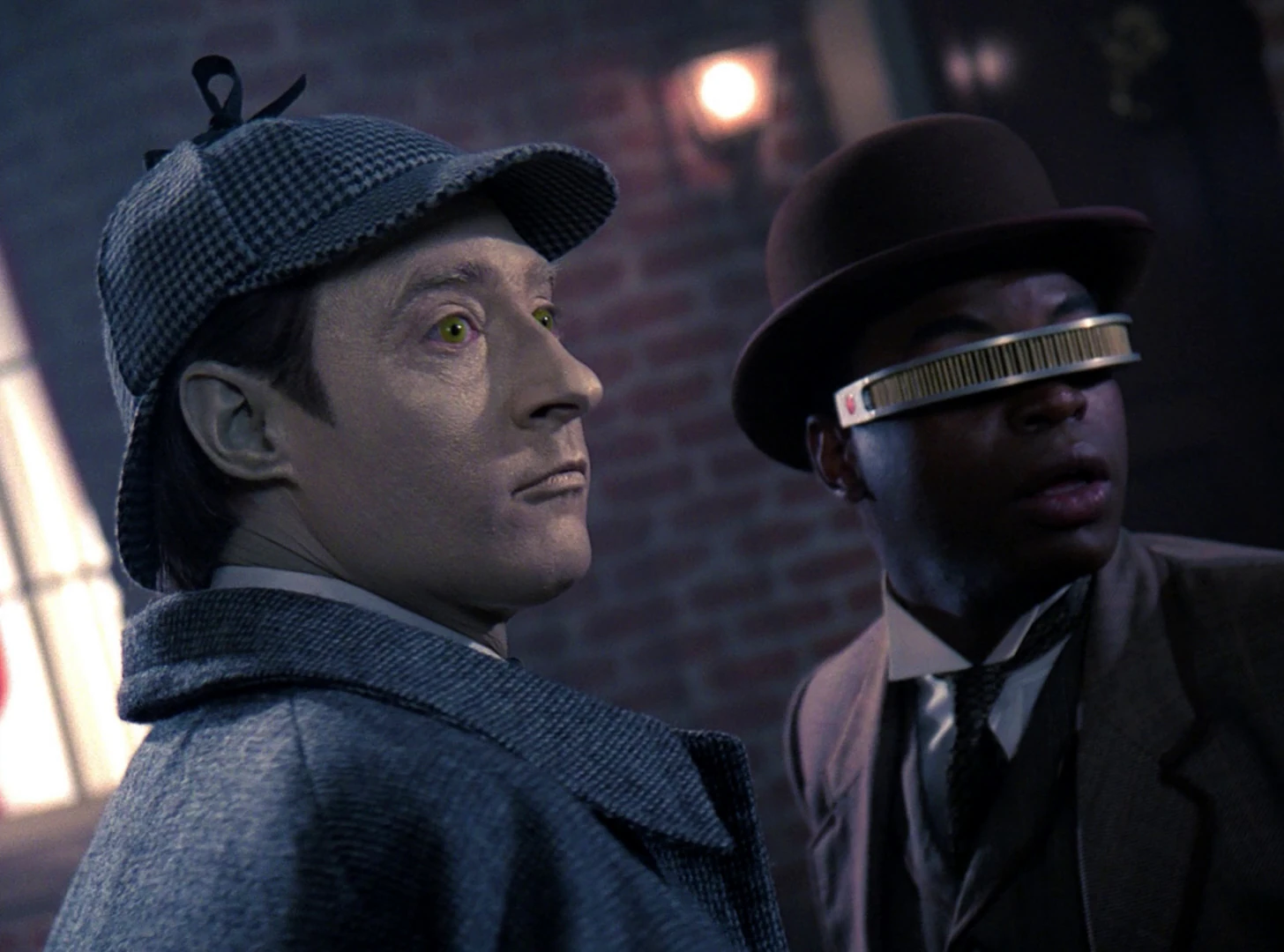 |
| via Memory Alpha |
Data and Geordi play Holmes and Watson on the holodeck. The cases are way too easy for Data to solve so Geordi challenges the computer to generate a character capable of defeating our favorite android. The result is Moriarty, Sherlock's nemesis in the original Sir Arthur Conan Doyle stories. Fortunately, Geordi did not specify that the foil should be able to best Picard, too...
Now we're cooking. To me, this is easily the best TNG episode so far. The look of Victorian London is outstanding, drawing two Emmy nominations: one for art direction, one for costumes. The episode is worth the time just to see Worf in period clothing.
I credit the screenwriter, Brian Alan Lane, for the story's success. "Elementary, Dear Data" is Lane's only Trek credit and it's a great one. Moriarty (Daniel Davis) is one of TNG's finest villains, charming yet deadly. One gets the sense Dr. Pulaski doesn't half mind being kidnapped. Moriarty accepts defeat graciously, though not with total resignation. Due to rights issues with the Doyle estate, TNG wasn't able to air a sequel until Season 6.
Speaking of Pulaski, and following up on last week's post, I like the development between her and Data here. In this case, her needling of him feels more like the good-natured ribbing of a friend. Again, I credit the superior writing.
Daniel Davis was born November 26, 1945 in Gurdon, Arkansas. His most famous role is the butler Niles on The Nanny. As both Moriarty and Niles, he affected a convincing English accent despite his natural, thick southern drawl. In addition to his screen credits, Davis has had a long career on stage, including a Best Actor Tony nomination for Wrong Mountain in 2000.
Now we're cooking. To me, this is easily the best TNG episode so far. The look of Victorian London is outstanding, drawing two Emmy nominations: one for art direction, one for costumes. The episode is worth the time just to see Worf in period clothing.
 |
| via The mOvie blog |
I credit the screenwriter, Brian Alan Lane, for the story's success. "Elementary, Dear Data" is Lane's only Trek credit and it's a great one. Moriarty (Daniel Davis) is one of TNG's finest villains, charming yet deadly. One gets the sense Dr. Pulaski doesn't half mind being kidnapped. Moriarty accepts defeat graciously, though not with total resignation. Due to rights issues with the Doyle estate, TNG wasn't able to air a sequel until Season 6.
Speaking of Pulaski, and following up on last week's post, I like the development between her and Data here. In this case, her needling of him feels more like the good-natured ribbing of a friend. Again, I credit the superior writing.
Acting Notes
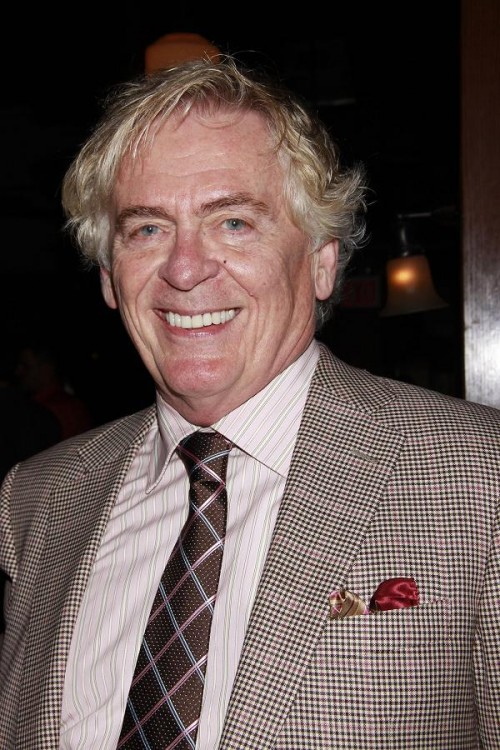 |
| via Gotham Wiki |
Wednesday, April 1, 2020
Squid Mixes: Brandy Manhattan
My wife recently brought my attention to David Lebovitz's French Manhattan recipe. While I expect we'll try it at some point, we didn't have all the ingredients on-hand (though our favorite liquor store is doing curbside service at this strange world moment). I thought a Brandy Manhattan might be an acceptable alternative in the meantime. I got my recipe from The New York Bartender's Guide: brandy and sweet vermouth in 4:1 ratio, a dash of Angostura bitters and a cherry garnish.
The result was nice. Brandy is sweeter than whiskey. That's a given. In fact, one wonders at the need for vermouth at all. Might dry vermouth be more interesting? Dry Brandy Manhattan recipes do exist. I don't think I could ever go all brandy all the time but it is nice for variety from time to time. We'll certainly try the French Manhattan another time.
Squid on the Vine
Poderi Cellario, Langhe Dolcetto 2018
Dry
A little sour
Cat pee
My Rating: 8.0
Bisceglia, Terra di Vulcano Aglianico del Vulture 2016
My Rating: 8.0
Foral de Melgaço, Vinho Verde Old Vines Alvarinho 2018
Starts with a bright peach, then fades to a light apple
An exciting little wine
I generally like vinho verde and this one had some nice dimension
My Rating: 8.4




